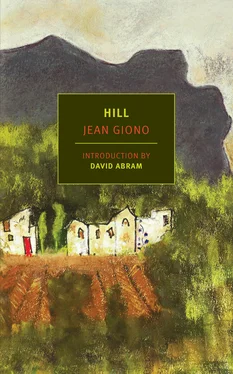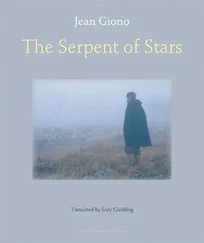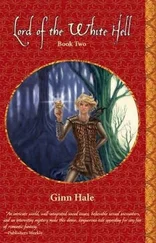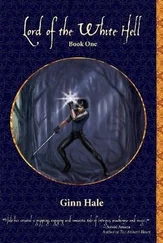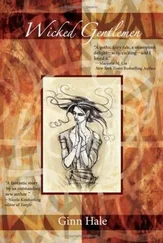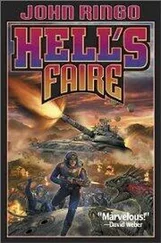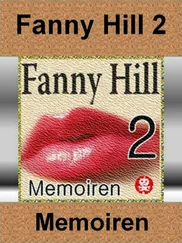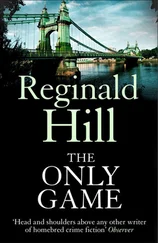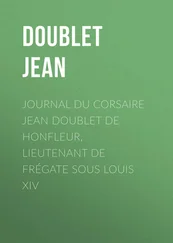Gagou heads off in the direction of this village.
“Hey,” says Maurras softly.
They stop. Gagou’s footsteps ring out clearly ahead of them.
“He’s going up top.”
“So it seems.”
“Do you feel good about going there at night?”
“Together, yes. Alone, I’d be heading back. But there’s two of us. More than that, we have got to know where he’s getting his water.”
•
The moon turns Gagou into an unearthly being. Instinctively, now that he’s out in the wild, he’s taken on the restless, slicked-back look of an animal. His spine is arched, his neck is drawn down into his shoulders. He advances with his head tilted forward. His lanky arms dangle almost to the ground, like paws. He’s doubled in this posture by a monstrous, quadruped shadow, which leaps forward by his side.
He keeps on changing his song-like cry. At times his gait again takes on the air of a dance, and then his voice scatters farther afield, sharper and more ecstatic.
•
When they’re about to pass through the notch in the rocks, Maurras whispers “Hey!” one more time, and stops Jaume.
“Listen.”
“Yeah, just a moment ago, I did too.”
“On the left?”
“On the left.”
“That’s weird. That’s over by Imbert’s End. Who could that be?”
“No idea.”
They can hear what sound like footsteps on the slope of the hill, as though somebody was walking beside them along a parallel path.
Some stones roll down the slope. Gagou keeps moving up ahead.
They go back to walking gingerly, with their ears cocked.
“It’s somebody who knows the way.”
“Can’t you see anything, you with your sharp eyes?”
Maurras can’t see a thing, but he stays put and holds Jaume back by the arm.
“Jaume, let’s go back. Listen to me. Other than the two of us and Gagou, who could be out at night, walking toward this village, in this wasteland? Who? Unless…
“You know as well as anybody. It’s no fairy tale — since the cholera, things happen up here that it’s better not to stick your nose into. You saw that shepherd from Les Campas when they carried him back down on some fence-posts. You saw him? He didn’t die an easy death. Did you see his eyes? And his neck twisted up like a well-rope.”
For a moment, Jaume is taken back there, not saying a word. Maurras’s voice lingers, living on inside of Jaume’s head. He did see the dead shepherd, did see the twenty dead sheep, the dead dog, the clouds of flies swarming through the deserted street.
He bleats out, in a muffled voice:
“I know, César, but what about the water?”
•
He’s spoken the word that needed to be said, for Maurras, and for himself. It’s water — the memory of water — that pushes them on. The night air brushes their cheeks like a refreshing promise. In front of them, the body of Lure looms up, massive: the mother of waters, the mountain that stores water in the dark recesses of her porous body. Somewhere in the distance, the flute-like song of a spring is quavering. From amongst the grasses a big, flat rock shimmers like a watery eye. Moonlight pours down from the top of the heavens and sprays back upwards as a white mist. Gagou’s shadow swims through it like a fish.
•
“You didn’t hear anything more?”
“No. Maybe it was somebody from Villemus on his way home.”
“We’d better hope so.”
“It’s not far from there to the Eyries road. Maybe it was somebody from up top coming back by the shortcut. Yesterday was fair day in Manosque.”
“Once in a while there’s a fancy-ribbon man out on the road.”
“Once in a while.”
•
And right there, across their path, lies the skeleton of the village. It’s nothing more now than a pile of broken bones lashed by the wind. The long, drawn-out current of the air howls through the vacant houses. Fragments of bone gleam beneath the moonlight.
In the wind’s hollow the village lies motionless. Grasses swell around it like the sea.
•
Gagou follows a well-worn path through the nettles. Now he’s fluttering and leaping like a dead leaf, as though the wind were toying with him.
Maurras and Jaume straddle the fallen beams and stones with care. But they still can’t stop the canteens slung over their shoulders from clattering.
“This is the worst time to make any noise, laddy,” says Jaume, who’s halted flat on his stomach, on top of a mound of rubble. “I think we’ve found it. Let’s leave all the tins under the brambles. We’ll come back for them in a minute.”
The houses cast a shadow, shaped like a saw, onto the street. From time to time it seems as if a window is lit up from within, but no, it’s only one that’s open more directly to the moonlight. This same cold light inhabits hearths long since bereft of crickets. It sharply defines shadows shaped like hooded men, who keep vigil in rooms with sunken floors, amid the riot of nettles and hawthorns.
There’s a barn, almost intact, with an arch-topped door, and a bit of straw sticking out. It’s through here that the shepherd of Les Campas disappeared that evening, in a heavy downpour, along with his flock and his dog — the whole lot of them, just as they were hurrying by on this side.
Gagou takes a single leap and vanishes.
Jaume lifts his nose, takes a long sniff.
“I smell water.”
As they arrive at the top of the climbing street, suddenly they see: It’s a square.
The facades of the houses are still standing upright. A lopsided balcony supports a broken flagpole and a placard where you can still read “Republican Club.” Grass is growing in between the paving stones. A mulberry tree makes cooing sounds as it’s tousled by the moon’s wan hand.
In the middle of the square a venerable fountain thrusts out the belly of its basin. Aside from Mount Lure and the trees, this must be the most ancient thing in the whole district. Harness bits have rubbed and worn away its rim. A pillar with bronze spouts rears up above the circular basin. Four marble-cheeked cherubs are blowing with their mouths around the pipes… and there’s no water coming out. Even so, the basin is brimming with clear liquid. In its abundance it streams over the paving stones, and its force has undermined them. Huge horsetails have sprung up through the pavement. This pillar, it’s alive, like somebody shivering inside a coat. Spring water oozes from the moss up and down its whole length. There’s nothing dry except the four cherubs’ heads, whose marble masks gaze at the lifeless houses.
•
Gagou is there, sprawled over the water. His arms are churning away like a millwheel, and water is gushing up around him. It’s getting all over him — his hair, the down on his chest, his scrawny back. And you can hear it sluicing down the legs of his canvas pants.
Now he’s drinking.
With outstretched arms he grabs hold of the basin, this gigantic, overflowing goblet, and presses his mouth against a crack in the rim. Between mouthfuls he moans with pleasure like a nursing infant.
•
The two men observe this manic glee. Their own joy is more restrained. It ripens inside their minds like a giant sunflower.
“We’ll have to clean out the basin,” breathes Jaume.
“And fix the pipe,” says Maurras.
“We’ll come with the canteens and take turns,” says Jaume.
“Take turns, just like in the army,” says Maurras.
There they are, in the shadows, twin statues in the recess of a shrine. As they breathe words back and forth, the bloom of their joy spreads out wider than the sun’s rays.
“I’m going for the canteens,” says Jaume.
•
“And, all things considered,” says Maurras, drawing his absinthe toward him, “it’s just as well that Jaume didn’t see what I saw.”
Читать дальше
